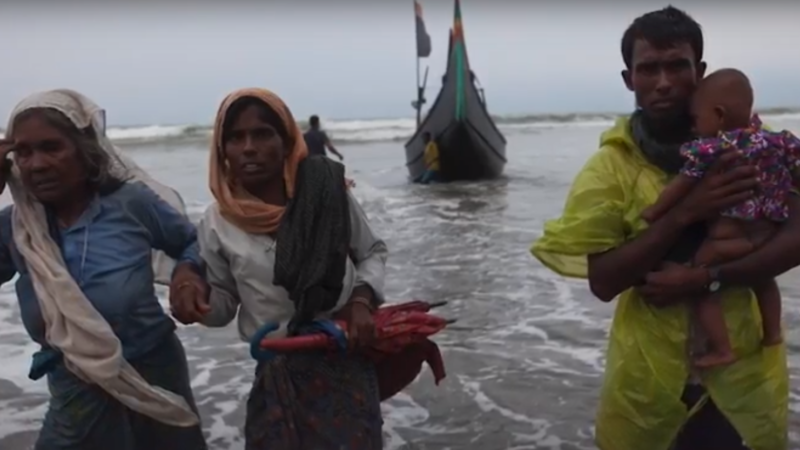
On Wednesday morning, the United Nations’ human rights office published their latest report into the persecution of Rohingya Muslims in Myanmar. Based on 65 interviews with individuals and groups who had recently fled Rakhine State and crossed the boarder to Cox’s Bazar in Bangladesh, the report makes for uncomfortable reading.
“Brutal attacks against Rohingya” have been “well-organised, coordinated and systematic,” it claimed. In the opinion of the team from the UN, the violence perpetrated by the Burmese military has been carried out “with the intent of not only driving the population out of Myanmar but preventing them from returning to their homes.”
Since attacks against government buildings on August 25 by the Arakan Rohingya Salvation Army (ARSA), more than 500,000 Rohingya have fled Myanmar. According to the report, however, the military operation, named as a series of “clearance operations” which followed these attacks, had been active long before. The scale of these human rights violations is unprecedented in Myanmar’s recent history and the subsequent humanitarian crisis that now follows asks profoundly urgent questions of the international community.
The military’s campaign against the Rohingya has been long and indiscriminate. When I visited the country in 2013 after an escalation of violence the year before, I saw the disastrous effects brought onto a community forced to flee to remote areas of the countryside. After travelling by boat to Pauktaw, a UNHCR-run camp, I saw the shores of the beach next to the camp covered in faeces with dead vermin just yards away from bathing children. I heard of horrific stories of women being raped, children and male members of the families being killed.
Since that escalation of violence in 2012, the situation for Rohingya Muslims in Rakhine has worsened dramatically. In October of last year, after nine border officers were killed, the region’s Muslim minority – already excluded, impoverished and persecuted – once again fell victim to a sharp increase in targeted violent attacks and, according to Amnesty International, eyewitness accounts from those refugees suggest that “Myanmar’s security forces, led by the military”, were “torching hundreds of homes”.
Some 100,000 Rohingya fled Myanmar to Bangladesh. When I visited Rahkine again this year, I witnessed similar horrendous conditions for the displaced Rohingya.
A report in February 2017 by the OHCHR detailed the horrendous human rights violations the Rohingya had been experiencing over the last year: mass gang rape, killings – including of babies and young children, brutal beatings and disappearances all were documented by the UN.
The Rohingya in Myanmar are constitutionally deprived of their rights thanks to the country’s 1982 Citizenship Law. This entitles those who live in Myanmar to full citizenship only if they are a member of one of the “national races,” a term that considers only those who had settled in Myanmar prior to 1824, the date of the first occupation of the British.
After yet another escalation in the levels of attacks on the Rohingya in Rakhine a few months ago, British MPs and peers responded swiftly in August to reports from human rights organisation of more violence.
On September 6, more than 170 parliamentarians signed a letter to Boris Johnson denouncing the horrific acts of violence and outlining two urgent priorities for the British government. The first was for the foreign secretary to do whatever he could to halt the military offensive against Rohginya civilians. To do this we urged the government to exert more pressure on Burma’s military leaders. Aung San Suu Kyi’s failure to condemn the violence and stand up for the Rohingya’s rights and stand up to the military has been deeply disappointing. However with power over security operations constitutionally residing with the military, her power to halt the military offensive is limited, while her ability to speak out in defence of the Rohingya is, of course, not.
Given that more pressure needs to be exerted on the military leaders who hold the power in Myanmar to stop the “clearance operations”, it is right that Theresa May announced at the UN in September that all military training contracts between the British military and Myanmar military would be immediately suspended. But this is not enough. There must concerted international pressure on the Burmese civilian and military government to stop the killings and persecution and negotiate a process for the protection of those remaining Rohingya in Burma and the return of those that have been forced to flee.
A further urgent priority is to address the urgent humanitarian needs of those Rohingya who have fled. With such a large and immediate movement of so many displaced people, urgent humanitarian relief is required. It was therefore welcome to learn that the Department for International Development was increasing its levels of humanitarian assistance for Myanmar to £25m.
The disasters emergency committee has also launched an appeal for urgent donations to provide food, water, shelter and medical supplies to those who have fled the violence.
In parliament pressure will continue to be exerted on the government to continue to do all it can to help the Rohingya. On Tuesday, the Commons will set aside three hours to discuss the persecution of the Rohingya and call on parliamentarians to back the UN claim of a few weeks ago – now strengthened by this report – that the treatment of the Rohingya by the Burmese military is a “textbook example of ethnic cleansing.”
It is paramount that pressure continues to be exerted on the Burmese military, as well as on Aung San Suu Kyi, to bring an end these shocking human rights violations and the ensuring humanitarian crisis.
Rushanara Ali is MP for Bethnal Green and Bow and a former shadow international development minister.




More from LabourList
‘AI regulation is key to Labour’s climate credibility’
Ben Cooper column: ‘Labour needs to rediscover its own authentic populism’
‘Westminster rethought: a new purpose built site and a museum of democracy’